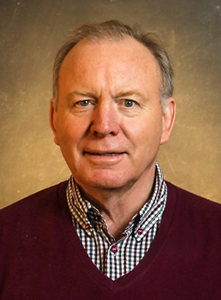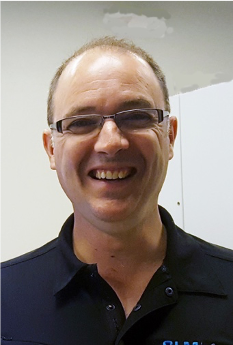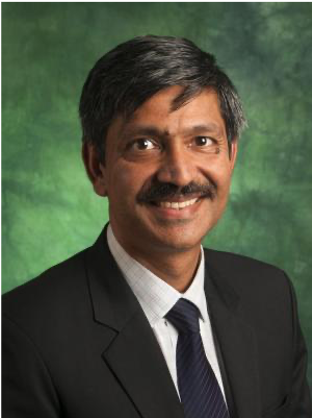CAAAM Board of Advisors
Craig Blue
 Craig Blue, Ph.D., is the Director of Energy Efficiency and Renewable Energy Programs
for the Energy and Environmental Sciences Directorate at Oak Ridge National Laboratory,
Oak Ridge, Tenn. The Energy Efficiency and Renewable Energy Portfolio at ORNL represents
significant U.S. Department of Energy program investments in areas that include the
offices of advanced manufacturing, building technologies, and vehicle technologies,
and capitalizes on ORNL's world-class user facilities such as the Spallation Neutron
Source, Center for Nanophase Materials Science, Building Technologies Research and
Integration Center, Carbon Fiber Technology Facility, Manufacturing Demonstration
Facility, and the National Transportation and Research Center.
Craig Blue, Ph.D., is the Director of Energy Efficiency and Renewable Energy Programs
for the Energy and Environmental Sciences Directorate at Oak Ridge National Laboratory,
Oak Ridge, Tenn. The Energy Efficiency and Renewable Energy Portfolio at ORNL represents
significant U.S. Department of Energy program investments in areas that include the
offices of advanced manufacturing, building technologies, and vehicle technologies,
and capitalizes on ORNL's world-class user facilities such as the Spallation Neutron
Source, Center for Nanophase Materials Science, Building Technologies Research and
Integration Center, Carbon Fiber Technology Facility, Manufacturing Demonstration
Facility, and the National Transportation and Research Center.
Dr. Blue's pioneering spirit brings a rich background as both a researcher and a scientific leader to his position. He has more than 21 years of experience in conducting research in materials and manufacturing technologies, authored nearly 100 open literature publications, holds 15 U.S. patents, and received multiple awards including 10 R&D 100 Awards. He has served by invitation on numerous scientific and technical review panels, committees, and convocations convened by the National Science Foundation, the Council on Competitiveness, Manufacturing USA, and National Academies of Sciences and Engineering. He is a Battelle Distinguished Inventor, Fellow of ASM International, holds faculty appointments at the University of Tennessee, Knoxville, Tenn., University of North Texas, Denton, Texas and the Colorado School of Mines, Golden, Colo.
In his most recent role, Dr. Blue served as the chief executive officer of the Institute for Advanced Composites Manufacturing Innovation, an institute within the White House Manufacturing USA initiative comprising a public-private partnership to increase domestic production capacity, manufacturing capabilities, and create jobs across the U.S. composite industry.
Robert Carter
 Robert Carter, Ph.D., is an industry leader in research and strategy development for
advanced materials and manufacturing with more than 18 years of experience in the
defense and medical sectors. Most recently, Dr. Carter was the director for Advanced
Materials and Process Engineering at Stryker Orthopedics where he was responsible
for leading the development of new materials and additive manufacturing techniques
for next-generation orthopedic devices. Prior to that, he spent 16 years with the
U.S. Army Research Laboratory where he was the branch chief of materials manufacturing
technology and the founding director for the Center for Agile Materials Manufacturing
Science. In these roles, Dr. Carter led the development of manufacturing technologies
for lethality and protection applications, research into additive manufacturing and
cold spray technologies, development of new materials and designs for U.S. Army applications
— alloys, ceramics, and composites, and the development of specifications and standards
for defense materials and manufacturing requirements.
Robert Carter, Ph.D., is an industry leader in research and strategy development for
advanced materials and manufacturing with more than 18 years of experience in the
defense and medical sectors. Most recently, Dr. Carter was the director for Advanced
Materials and Process Engineering at Stryker Orthopedics where he was responsible
for leading the development of new materials and additive manufacturing techniques
for next-generation orthopedic devices. Prior to that, he spent 16 years with the
U.S. Army Research Laboratory where he was the branch chief of materials manufacturing
technology and the founding director for the Center for Agile Materials Manufacturing
Science. In these roles, Dr. Carter led the development of manufacturing technologies
for lethality and protection applications, research into additive manufacturing and
cold spray technologies, development of new materials and designs for U.S. Army applications
— alloys, ceramics, and composites, and the development of specifications and standards
for defense materials and manufacturing requirements.
He led the army's long-term manufacturing research strategy and was ARL's representative for the U.S. Department of Defense working group with AmericaMakes to create the DoD Additive Manufacturing Roadmap. He has a Ph.D. in materials science and engineering from Virginia Polytechnic Institute and State University, Blacksburg, Va., and serves on the external advisory boards for the mechanical engineering departments at Pennsylvania State University and Worcester Polytechnic Institute, Worcester, Mass.
Hamish Fraser
 Hamish Fraser, Ph.D., is an Ohio Regents Eminent Scholar and Professor of Materials
Science and Engineering and Director of the Center for the Accelerated Maturation
of Materials at Ohio State University, Columbus, Ohio. He graduated from the University
of Birmingham, England with degrees of B.Sc. (1970) and Ph.D. (1972). He was appointed
to the faculty of the University of Illinois, Champaign, Ill., in 1973 as an assistant,
associate, and full professor, before moving in 1989 to Ohio State University as an
Ohio Regents Eminent Scholar and professor. He has also been a Senior von Humboldt
Researcher at the University of Göttingen, Germany, a senior visitor at the University
of Cambridge, England, and an honorary professor of materials and technology at the
University of Birmingham, England, since 1988. He has been a member of the National
Materials Advisory Board and the U.S. Air Force Scientific Advisory Board. He is a
fellow of TMS, ASM, IOM3 (UK), and MSA.
Hamish Fraser, Ph.D., is an Ohio Regents Eminent Scholar and Professor of Materials
Science and Engineering and Director of the Center for the Accelerated Maturation
of Materials at Ohio State University, Columbus, Ohio. He graduated from the University
of Birmingham, England with degrees of B.Sc. (1970) and Ph.D. (1972). He was appointed
to the faculty of the University of Illinois, Champaign, Ill., in 1973 as an assistant,
associate, and full professor, before moving in 1989 to Ohio State University as an
Ohio Regents Eminent Scholar and professor. He has also been a Senior von Humboldt
Researcher at the University of Göttingen, Germany, a senior visitor at the University
of Cambridge, England, and an honorary professor of materials and technology at the
University of Birmingham, England, since 1988. He has been a member of the National
Materials Advisory Board and the U.S. Air Force Scientific Advisory Board. He is a
fellow of TMS, ASM, IOM3 (UK), and MSA.
He has published more than 380 papers in scholarly journals and graduated 48 doctoral students. His work is based on research involving the development of advanced methods of materials characterization involving high resolution and analytical electron microscopy, materials processing, and microstructure/property relationships. Dr. Fraser has an active research program in the development of new and improved materials, including advanced materials characterization, direct 3D microstructural representation, modeling microstructure/properties in light alloys, with an emphasis at present on Ti alloys, development of creep-resistant beta-Ti alloys, development of low modulus beta-Ti alloys for orthopedic implants, and powder metallurgy, including additive manufacturing ‚ LENS™, hot isostatic pressing, and Kinetic Metallization. More recently, he has concentrated effort on establishing and developing the CAMM and the Center for Electron Microscopy and Spectroscopy at OSU.
Richard Grylls
 Richard Grylls, Ph.D., has worked in the metal additive manufacturing industry for
more than 20 years. Dr. Grylls started in metal 3D Printing as a post-doctoral researcher
at The Ohio State University, Columbus, Ohio, where he became the first user of the
newly commercialized Optomec LENS metal 3D printer. After working at GE Aviation,
Dr. Grylls joined Optomec, manufacturer in Albuquerque, N.M., and served in a variety
of positions including applications manager and general manager for the LENS metal
3D printing technology. In 2015, he joined SLM Solutions Group, where his responsibilities
included application development, training, troubleshooting and technical leadership
for the North American market.
Richard Grylls, Ph.D., has worked in the metal additive manufacturing industry for
more than 20 years. Dr. Grylls started in metal 3D Printing as a post-doctoral researcher
at The Ohio State University, Columbus, Ohio, where he became the first user of the
newly commercialized Optomec LENS metal 3D printer. After working at GE Aviation,
Dr. Grylls joined Optomec, manufacturer in Albuquerque, N.M., and served in a variety
of positions including applications manager and general manager for the LENS metal
3D printing technology. In 2015, he joined SLM Solutions Group, where his responsibilities
included application development, training, troubleshooting and technical leadership
for the North American market.
He has worked at several feedstock factories making equipment since 2001 and is considered a leading expert in the technical and commercial adoption of laser metal deposition and powder bed fusion technologies. Recently, Dr. Gryll's work has focused on increasing industrial adoption of metal additive manufacturing by improving the economics of the process without sacrificing quality or resolution. He holds a bachelor's degree in materials science from the University of Oxford, England, and a Ph.D. in metallurgy from the University of Birmingham, England.
Kinshuk
 Kinshuk, Ph.D., is the dean of the College of Information at the University of North
Texas. Prior to that, he held the NSERC/CNRL/Xerox/McGraw Hill Industrial Research
Chair for Adaptivity and Personalization in Informatics, funded by the Federal government
of Canada, Provincial government of Alberta, and by national and international industries.
He was also a full professor in the School of Computing and Information Systems and
associate dean of Faculty of Science and Technology, Athabasca University, Canada.
After completing his first degree from India, he earned his master's degree from Strathclyde
University, Glasgow, Scotland, and Ph.D. from De Montfort University, Leicester, England.
His work has been dedicated to advancing research on the innovative paradigms, architectures
and implementations of online and distance learning systems for individualized and
adaptive learning in increasingly global environments.
Kinshuk, Ph.D., is the dean of the College of Information at the University of North
Texas. Prior to that, he held the NSERC/CNRL/Xerox/McGraw Hill Industrial Research
Chair for Adaptivity and Personalization in Informatics, funded by the Federal government
of Canada, Provincial government of Alberta, and by national and international industries.
He was also a full professor in the School of Computing and Information Systems and
associate dean of Faculty of Science and Technology, Athabasca University, Canada.
After completing his first degree from India, he earned his master's degree from Strathclyde
University, Glasgow, Scotland, and Ph.D. from De Montfort University, Leicester, England.
His work has been dedicated to advancing research on the innovative paradigms, architectures
and implementations of online and distance learning systems for individualized and
adaptive learning in increasingly global environments.
Areas of his research interests include learning analytics; learning technologies; mobile, ubiquitous and location-aware learning systems; cognitive profiling; and, interactive technologies. Kinshuk has more than 500 research publications in refereed journals, international refereed conferences and book chapters. He has been twice awarded the prestigious fellowship of Japan Society for the Promotion of Science (2008 and 2013). In his ongoing sustained professional activities, he has initiated professional movements at international and national levels. At the international level, he is founding chair of the IEEE Technical Committee on Learning Technologies, and founding editor of the Educational Technology and Society Journal. At the national level, he is the founding chair of the New Zealand Chapter of ACM SIG on Computer-Human Interaction and a past president of the Distance Education Association of New Zealand.
Brian T. Rosenberger
 Brian Rosenberger is a senior fellow at Lockheed Martin Aeronautics Company and has
worked in the aerospace industry for more than 36 years. He has considerable experience
in the aircraft conceptual-design arena and has served as principal investigator and
program manager for a wide variety of research and development projects, most of which
were focused on advanced materials and manufacturing processes. Since 1997, he has
concentrated his efforts on the research, development, and transition of additive
manufacturing processes and materials for aerospace applications. In addition to many
internal research and development projects, Mr. Rosenberger has worked with the U.S.
Air Force, Navy, Army, NASA, Defense Advanced Research Projects Agency, multiple national
labs, and several universities to further the state-of-the-art in additive manufacturing. He
has extensive experience with large-scale metal-additive manufacturing, closed-loop
process control, materials development, and process/property relationships.
Brian Rosenberger is a senior fellow at Lockheed Martin Aeronautics Company and has
worked in the aerospace industry for more than 36 years. He has considerable experience
in the aircraft conceptual-design arena and has served as principal investigator and
program manager for a wide variety of research and development projects, most of which
were focused on advanced materials and manufacturing processes. Since 1997, he has
concentrated his efforts on the research, development, and transition of additive
manufacturing processes and materials for aerospace applications. In addition to many
internal research and development projects, Mr. Rosenberger has worked with the U.S.
Air Force, Navy, Army, NASA, Defense Advanced Research Projects Agency, multiple national
labs, and several universities to further the state-of-the-art in additive manufacturing. He
has extensive experience with large-scale metal-additive manufacturing, closed-loop
process control, materials development, and process/property relationships.
Mr. Rosenberger is a subject-matter expert at Lockheed Martin and has expertise in integrating advanced technologies into the supply chain, including working with international production partners. Mr. Rosenberger is a graduate of Texas A&M University, College Station, Texas, with a degree in aerospace engineering, and currently serves on advisory boards at Pennsylvania State University, The University of Texas at Austin, Colorado School of Mines, Golden, Colo., The University of North Texas, Denton, Texas, and the American Society of Mechanical Engineers. He holds 13 U.S. patents.